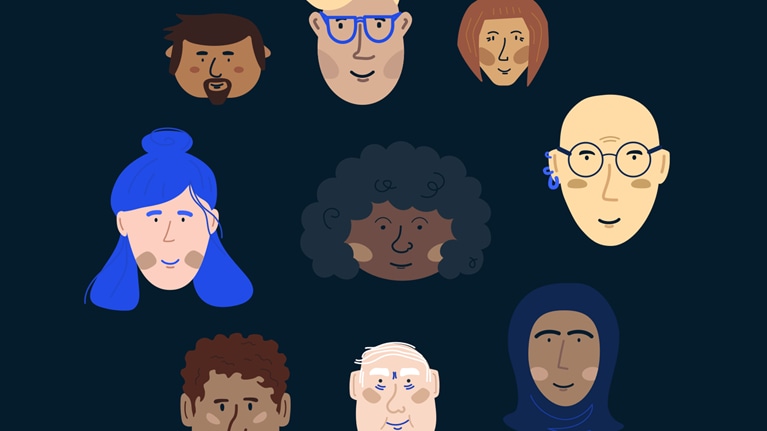In this edition of Author Talks, McKinsey Global Publishing’s Raju Narisetti chats with former marketing executive Dalia Feldheim about her new book, Dare to Lead like a Girl: How to Survive and Thrive in the Corporate Jungle (Rowman & Littlefield, June 2022). While at Procter & Gamble, Feldheim led the viral Always #LikeAGirl campaign. Now she’s bringing the same message to corporate leaders, who she says would benefit from incorporating more collaboration, empathy, and intuition into their leadership style. An edited version of the conversation follows.
What is the meaning of the book’s title?
The book is basically a provocation for all leaders—women, as well as men—to connect to their more feminine traits, like passion, emotion, and relationship in the workplace and about the importance of bringing them to the workplace, today more than ever before.
In 2014, we created the Always #LikeAGirl campaign for Procter & Gamble. Our goal with that commercial was to reclaim the phrase “like a girl” to mean “be proud to be who you are.” I believe it’s time to reclaim the phrase once again—this time, in the world of leadership.
There’s no such thing as a masculine brain or a feminine brain; we all have within us both masculine traits and feminine traits. Things like emotion in the workplace, teamwork, intuition—those are positive feminine traits. Positive masculine traits are things like direction and logic. The issue we’re seeing is that the business world is collapsing to what they call the “wounded masculine”—a world of competition over collaboration and power over people, versus power with people.
My book title is a provocation to call all leaders—men and women—to tilt back that reality and dare to lead more like a girl, which means rotating between those positive masculine and positive feminine traits. It’s a provocation for all of us to connect to these innate feminine traits that we all have within us.
How can leaders embrace more feminine leadership traits?
Harvard Business Review did research back in 2012 to try to understand why there are not more women in leadership roles. Are women not as effective as men? In 2012, they found out women were as effective as men. They repeated the same research in 2019, and they found that women scored better than men in 17 out of 19 leadership traits. I summarize these traits in my book in what I call the “5P model.”
The first P is for passion and purpose. Purpose is when we align our strengths, our passion areas, and what the world needs.
The second P is for perspective. This is around the growth mindset; this is around stopping and asking for directions; this is around admitting mistakes. The number-one driver of high-performance organization is psychological safety, and the number-one driver of psychological safety is if the leader admits mistakes. Perspective is all about the leader’s ability to step back and look at their failures as opportunities for growth.
The third P is something that I call “power-up,” or physical wellness. We’re seeing burnout left, right, and center because we are not taking the time to put our oxygen masks on ourselves first before we attend to others.
The third P is something that I call ‘power-up,’ or physical wellness. We’re seeing burnout left, right, and center because we are not taking the time to put our oxygen masks on ourselves first before we attend to others.
Our last two are probably the most important. The fourth P is people. We know that becoming a leader is very different than being a manager. You’re not managing the business; you’re managing the people who manage the business. The people trait is all about how you manage relationships, how you get to know your employees as human beings, and how you foster deep connections because the number one driver of happiness is relationships. The number-one driver of happiness in the workplace is if you have a best friend at work, so the people trait is critical.
The last one—and the essence of it—is positivity. Positivity is not about being happy-happy all the time. It’s about giving ourselves permission to be human. It’s about something I call “emotional bravery,” which goes way beyond emotional intelligence—it allows emotions and empathy to come out. We’re seeing a huge decline in empathy among university students today versus 30 years ago because we’re all behind digital screens. The role of the leader is to elicit empathy.
What does it mean to be politically savvy at work?
I personally remember thinking, “Politics is the worst.” I kept on saying, “I don’t do politics. I’ll do my work, and my work will speak for itself.” I think many women think politics is negative, but I want to help women understand that politics just means being strategic and smart about how you go about achieving results.
I would walk into meetings and create this beautiful sell, not understanding that the decision had already been made on the golf course or way before because of alliances and discussions. Especially when I was in the C-suite and the only woman in a group of men, it’s something that I had to pick up on. I had to become more politically savvy, which basically means understanding the room and dynamics. It doesn’t mean losing your integrity—it just means being smart about things, creating alliances.
Especially when I was in the C-suite and the only woman in a group of men … I had to become more politically savvy, which basically means understanding the room and dynamics. It doesn’t mean losing your integrity—it just means being smart about things, creating alliances.
There’s a great model or analogy about how different animals can both read the room and keep their integrity; the owl is high in understanding of the room but also high in integrity. How can we be owls rather than sheep, for example, which don’t understand the room but may have high integrity? Another animal, the fox, has high understanding of the room but low integrity, and the donkey is low in both of them.
This model helped me understand how we can reframe being politically savvy into being strategic and smart about how we achieve results. Women score lower on this because they think that it’s something they don’t want to engage in. But it’s the reality when we get to senior roles, so you better learn how to do politics smartly while keeping your integrity.
Why did you write this book now?
The reason I was driven to write the book is my own experience. For 17 years, I was in a state of flow, and I felt what it feels like to work with a company that really appreciates you as a human being. Then I worked with a boss who was extremely controlling and denigrating, and I saw how my performance shrunk because I was so busy defending myself. Sadly, what happened to me is way too prevalent in the workplace today.
Gallup shows 85 percent of employees are unhappy in the workplace, and 20 percent of employees are so unhappy that they’re making other people unhappy—these are the toxic employees. One in four employees also experience acute anxiety, but this was before the COVID-19 pandemic. We’re seeing the COVID-19 crisis accelerate all of this significantly. People have had the time to reflect on where they are and what’s important for them in life, and the outcome is the Great Resignation.
The number-one driver of the Great Resignation is toxic environments, so we’re seeing that our previous models are not working for us. In the midst of this crisis, it’s actually those more feminine traits—like intuition and empathy—that are becoming critical. How can you manage a remote team if you don’t have empathy? It’s becoming ever more complicated.
I’m an optimist, and I think we can turn this around. When I talk about happiness in the workplace, I have CEOs tell me, “Oh, Dalia, it’s fluffy.” Then I show them the data. Workplace unhappiness is costing us $7 trillion in stress-related disease, absenteeism, et cetera. However, we can turn it around.
Isn’t being resilient enough now?
We have learned that we can teach ourselves to become more resilient, more empathetic. Crisis is a great opportunity for growth, and posttraumatic growth is different from resilience. Resilience is when you’re able to bounce back. Posttraumatic growth is when you’re able to grow from your traumas, and I think the pandemic was a great opportunity for that.
Crisis is a great opportunity for growth, and posttraumatic growth is different from resilience. Resilience is when you’re able to bounce back. Posttraumatic growth is when you’re able to grow from your traumas, and I think the pandemic was a great opportunity for that.
In Chinese, the word for “crisis” means “danger” but also “opportunity.” It’s the same in Hebrew—the word for “crisis” is actually the last stage before birth. I think we’re in an important inflection point. The questions are, what do we want to do about that? How focused are we on strength? Are leaders able to identify their team’s strengths and to bring their strengths to work?
Only 30 percent of employees know their strengths, and only 17 percent bring them to work every day. Yet employees who are focused on strengths are two times more likely to succeed. How are we, as leaders, making sure we’re putting the right people in the right seats on the bus? This is all about strengths, about seeing new opportunity, about perspective, and about the growth mindset.
We all had a lesson in resilience. We all saw that it’s OK not to be OK, that we can see hope, and that we can be grateful for and focus on what we have and what we can control. This is such a critical inflection point. If we all take the time to make sure we don’t go back into the grind but instead take in these learnings and reflect on them, we could have a beautiful inflection point.
“Courage” is probably the most misunderstood word. People perceive it to mean making decisions that others didn’t make, but “courage” actually comes from the French word coeur, which means “heart.” Courageous leaders lead from the heart. That’s the premise of Dare to Lead like a Girl.



